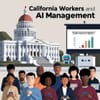California lawmakers are considering three bills designed to protect workers from AI management, but potential costs might hinder their passage. The bills, supported by the California Federation of Labor Unions, AFL-CIO, aim to regulate automated systems in the workplace and safeguard workers' rights.
The bills would require employers to notify workers 30 days before using AI to make employment decisions, such as compensation, hiring, firing, or promotions. Workers would also have the right to appeal AI-powered decisions, and employers would be prohibited from making predictions about workers based on immigration status, health, or psychological state.
One bill, Senate Bill 7, focuses on regulating AI use in employment decisions, while another, Assembly Bill 1331, targets automated systems in recruitment, hiring, and promotion processes to prevent automated discrimination. A third bill, Assembly Bill 1018, mandates testing before using automated systems that make consequential decisions about employment, education, housing, healthcare, financial services, and parts of the criminal justice system.
However, concerns about compliance costs are mounting. According to estimates, state agencies could face costs of hundreds of millions of dollars, while businesses might incur costs of up to $1 billion due to expanded human resources staffing needs. Some lawmakers and business groups argue that these costs might be too high, potentially undermining the benefits of the bills.
Despite these concerns, labor unions and digital rights groups strongly support the bills, emphasizing workers' rights and protections. On the other hand, business organizations, hospitals, and healthcare providers oppose the bills, citing potential costs and impact on innovation. The debate highlights the challenges of balancing worker protection with business needs in the age of AI.


